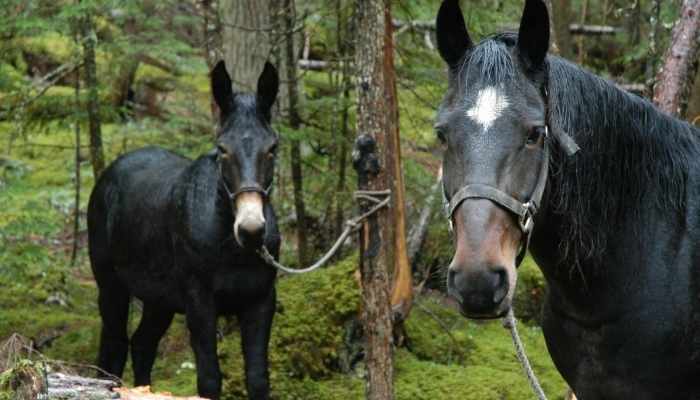Here is a quick answer to How much does a Mule cost? Mules, bred from a male donkey and a female horse, offer the best best of both worlds. Mules have advantages over both animal species as they are larger and faster than donkeys but less finicky about food and living conditions.
Celebrated for their intelligence and hardiness, mules work in the cruellest environment with no complaints. Mules outlive horses and withstand rougher terrain well.
Why you should buy a Mule
Mules come at top benefitting the owners in cutting the workload. Following are the reason why you should go for a mule
- Mules will save some of the vet’s bills as they are more resistant to diseases. Mules have tough skin to combat harsh weather. Their sense of self-preservation keeps them from harm’s way. Mules have harder hooves used to rocky terrain and water crossing and need fewer horseshoe replacements.
- Mules are famous for their endurance and longevity. On average, mules have a lifespan of 35-40 years. Some mules live up to 50 years.
- Don’t let the old adage “stubborn as mule” trick you into buying another working animal. They are docile when handled with kindness and patience. They prove to be a loyal partner once the trust is earned. Mules are naturally inclined towards human beings. Mules don’t obey when treated with force and abuse.
- Pulling a cart is daunting for a donkey but mules pull carts, push cows, trail rides and drag tarps with absolute ease.
- Mules are cheaper than horses. They get the horse’s job done with fewer upkeep costs. Unlike horses, mules quench their thirst and satisfy their hunger with lesser feed and fluids.
How much does a mule cost?
Buyers are always on the lookout for cheaper alternatives to get the job done. Purchasing a mule is in the buyer’s best interest as it comes with a lot of perks. The cost of a mule includes purchasing price and the upkeep cost.
In comparison with a horse, purchasing a mule is easy on the pocket.

Purchase Price
Depending upon a number of factors, mules price ranges between $1000 to around $8000. Young unbroken mules are cheaper than the rest. A buyer can get a strong healthy mule within the range of $1000 to $3000.
The mule purchase price is determined by different elements. Supply and demand and economic downturn contribute to a changing factor in pricing a mule.
Upkeep Cost
The purchase price is not the only thing buyer has to worry about when buying an animal. Maintenance costs are incurred in providing a healthy environment for a pet. Fortunately for a mule lover, the costs are less than keeping an equine. Following upkeep costs are incurred in owning a mule
- Feeding Expense: Mules are not heavy eaters like horses therefore the feeding expenses are less. The owner needs to spend $100 to $150 per month to feed a mule. Feeding costs are slashed when an owner has a pasture for a mule to graze on. The cost of hay is around $20 per bale. Prices change depending upon the area and quality. Apple, carrots, and other fruits and vegetables can be provided to the mule as treats.
- Shoeing and Hoof Maintenance Costs: Mules employed for work and recreational purposes need shoes. Working in higher temperatures and harsh conditions calls for hooves maintenance. Shoe replacement must be done every two or three months. A farrier may charge around $70 for shoe installation. The Owner can slice the cost of he knows how to shoe the mule himself.
- Medical costs: Though mules rarely get ill, a yearly visit to the vet is still a must. They often need treatment for parasitic infections lice and worms. An injury will add up to the medical costs. Vaccinations, feeding recommendations are all part of the mule care routine.
Interested in Knowing other horses price?
Conclusions
Mule is a hybrid horse that tends to take after the best of both his parents. Works like a dream, the mule is the buyer’s favourite work animal. Riding, working, or pulling loads mule does it all with no fuss. A buyer can get an alternative to a workhorse at an affordable price. Be it purchase price or upkeep cost, a buyer won’t be burdened much. They are affectionate companions with no match to their work ethics.







